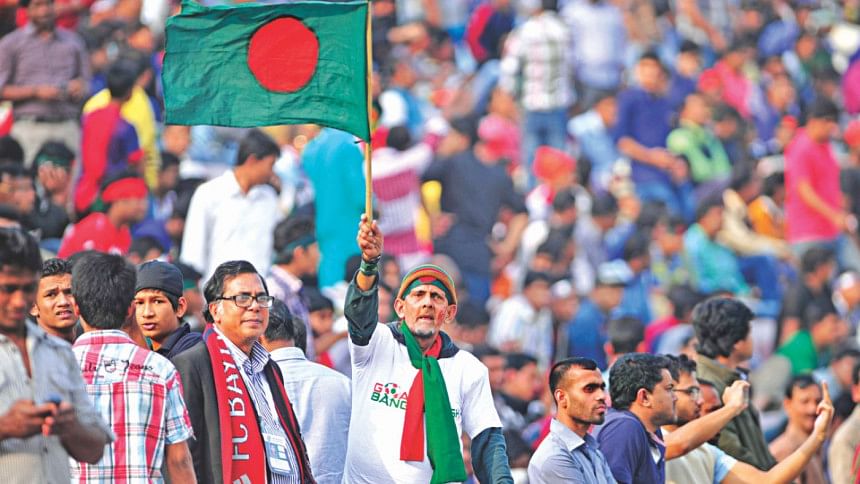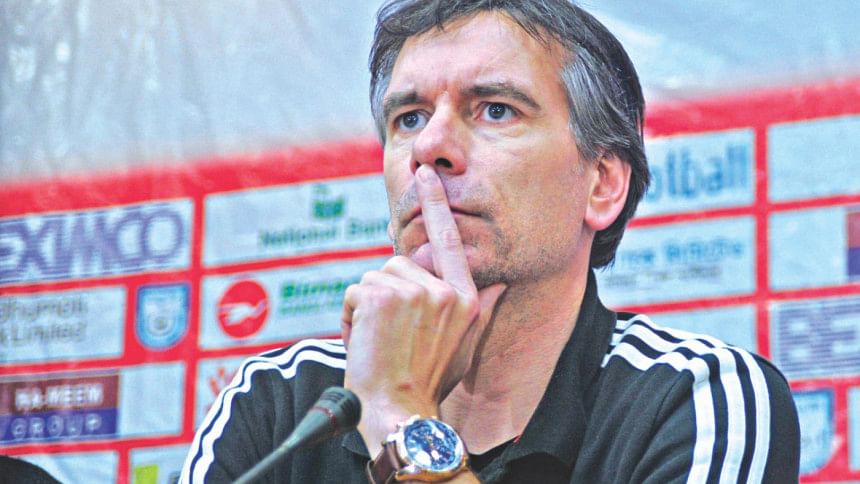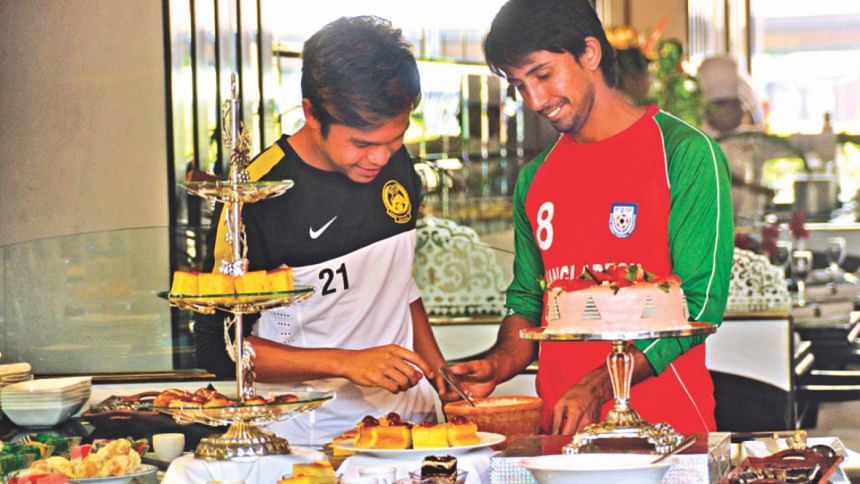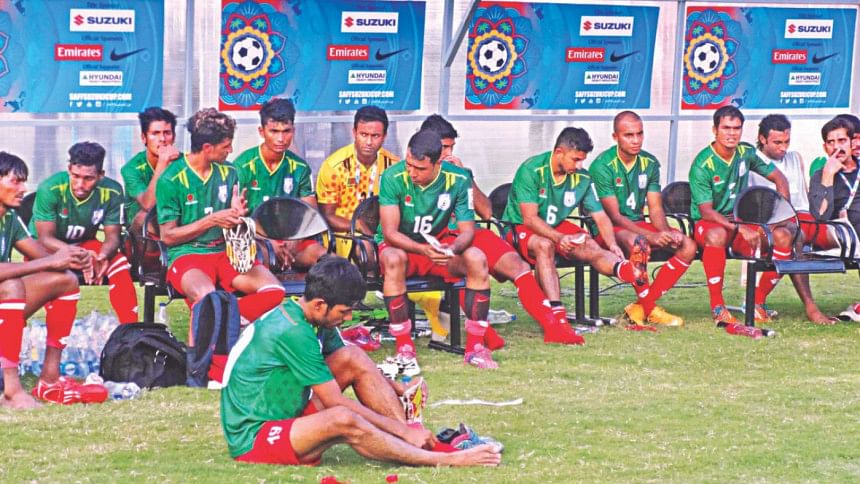In hope of better times

The job of a football journalist in Bangladesh comes with quite a few mental predicaments. For starters, it is quite difficult for a football journalist to ignore the nostalgia associated with the notion of a glorious past, and the continuous comparisons drawn between the current national team and those of the 'glorious' '80s or '90s.
This dilemma is augmented when you hear a lot of wishful thoughts from the players and team management, especially ahead of major tournaments, but find them eating humble pie at the end of it all.
However, the most ominous thing of all occurs when you see or hear things which you know you shouldn't put into words because bringing those things out in the open can seriously damage the image of the team and the players that you write and care about.

This reporter was faced with all these predicaments during and after the recent SAFF Suzuki Cup in Kerala where Bangladesh made an early group-stage exit and came home with only a victory against lowly Bhutan. The campaign had been hyped up by the players and the coaching staff as a mission of redemption, but proved to be all too forgettable, with talks of infighting and lack of commitment surfacing now and then. The year-ending campaign also portrayed a picture of a continual decline for the team which had kicked things off in great style through the Bangabandhu Gold Cup.
The tournament, reintroduced after a sabbatical of 16 years, created quite a buzz among the football fans in the early part of 2015. Six teams, including the national teams of Bangladesh and Sri Lanka and the under-22 sides of Malaysia, Thailand, Bahrain and Singapore took part in the tournament, which witnessed full-house crowds in all the matches involving the hosts. Having lost their opening match against Malaysia, Bangladesh made a strong comeback and reached the final, taking the level of expectation to an all-time high. A 3-2 defeat in the final against the Malaysians at a jam-packed Bangabandhu National Stadium (BNS) broke many hearts, but it also gave hope of a brighter future.

The real test for the national team, though, started when they started facing teams ranked much higher -- Australia, Jordan, Kyrgyzstan and Tajikistan -- thanks to the joint qualifiers for the World Cup and the Asian Cup. A few heartwarming performances in friendly matches against Malaysia, Singapore and Afghanistan were followed by some sorry losses against these big names, putting the heightened expectation of the football fans in its place. The poor results started having an adverse impact on the already strained relationship between the game's governing body and the then coach Lodewijk de Kruif.
The most talked about of these qualifying fixtures were the
two against the reigning Asian champions and four-time World Cuppers Australia, with the home match grabbing international headlines for the Socceroos' perceived 'security threat' and the measures taken by the Bangladesh government and the game's governing body to calm the Aussie nerves.
A large crowd witnessed that historic match at the BNS, where the men in red and green, this time under a new Italian coach who would be gone too soon, put up a commendable display in a 4-0 defeat. However, things went downhill from that point, leading to the sacking of the Italian and a short-term contract being handed to Maruful Haque just three weeks before the SAFF campaign.
Away from the national team, there were quite a few notable achievements in club football as well as women's and age-group football. Sheikh Jamal Dhanmondi Club followed on their King's Cup triumph from last year with a dogged display in the AFC Cup Pre-qualifiers and earned their place in the tournament proper, scheduled to be played across 2016. The Dhanmondi giants, however, have already started worrying about their supremacy as a new powerhouse has emerged in domestic football. Chittagong Abahani have started splashing big money on big name footballers and have already reaped the rewards by winning the title of the Sheikh Kamal International Gold Cup hosted in Chittagong.

The other tournament which caused a buzz among the locals and also ended in triumph was the inaugural SAFF Under-16 Championship in Sylhet. The Bangladesh colts entertained the crowd and kept the title at home by beating arch-rivals India in the final. Their immediate senior batch, too, had showed some promise but their campaign in the SAFF Under-19 Championship in Nepal ended at the semifinals stage. These two batches, though, were then put to sterner tests in the AFC Championships and they burst the bubble of expectation.
However, the most memorable of the victories was perhaps earned by the girls, in the AFC Under-14 Regional Championship in Nepal, towards the end of the year. The Bangladesh girls thumped Bhutan 16-0 before drawing against India to qualify for the semifinals, where they overcame powerhouse Iran with a commanding 2-0 win to set up a final clash against the hosts.
But disaster struck, quite literally, on the day of the scheduled final, as the Himalayan kingdom was struck by a massive earthquake, forcing an indefinite postponement of the final match.
The girls though returned to Nepal in December and came home with the champions' trophy. The win lifted some of the gloom surrounding football, but then came the disastrous SAFF campaign.
They say all's well that ends well. Had Bangladesh salvaged some measure of respectability in the SAFF Cup by at least reaching the semifinals, the year might have been painted with a different colour, considering the amount of work that has been put into the game all-around and the number of big-match exposure that the national team got. But it all ended in such a frustrating note that it will probably be a hard task for the players and the game's governing body to restore the feel-good factor anytime soon.
The writer is a senior reporter for the sports section of The Daily Star

 For all latest news, follow The Daily Star's Google News channel.
For all latest news, follow The Daily Star's Google News channel. 



Comments